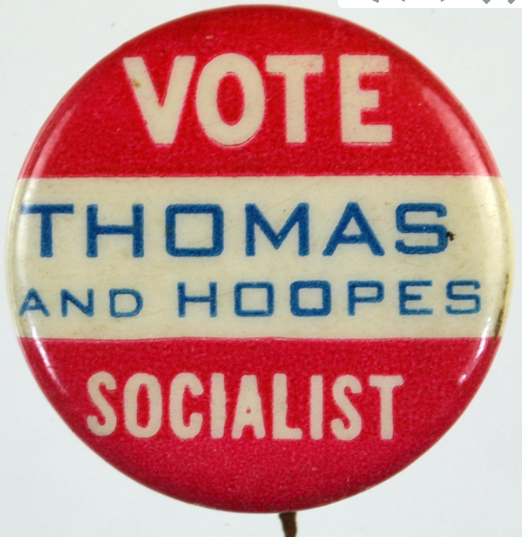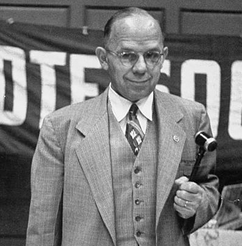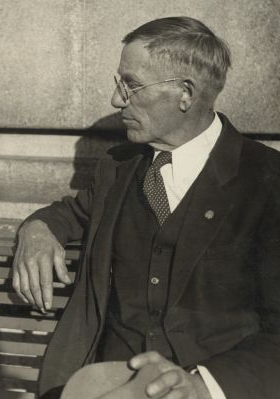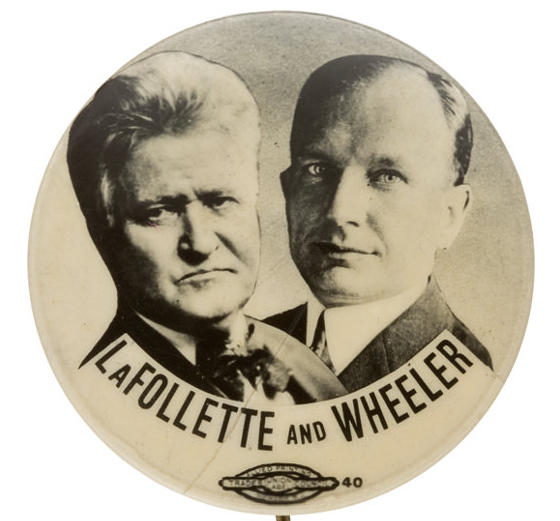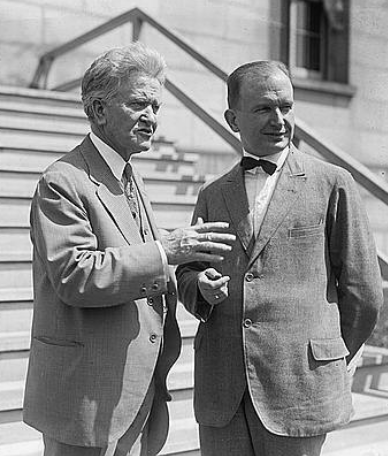Showing posts with label Socialist Party of America. Show all posts
Showing posts with label Socialist Party of America. Show all posts
Monday, August 19, 2019
Samuel Herman Friedman
Samuel Herman Friedman, February 20, 1897 (Denver, Colo.) – March 17, 1990 (New York, NY)
VP candidate for Socialist Party of America (1952, 1956)
Running mate with nominee (1952, 1956): Darlington Hoopes (1896–1989)
Popular vote (1952): 20,203 (0.03%)
Popular vote (1956): 2,128 (0.00%)
Electoral vote (1952, 1956): 0/531
The campaign (1952):
Six time Presidential nominee Norman Thomas was done with campaigning for elected office and after 1948 attempted to convince the Socialist Party of America to find other avenues to further the Party's agenda.
There were many factors contributing to the rapid decline of the SPA. To name just a few-- Like several other third parties, they had run (between Debs and then Thomas) personality-driven campaigns where one individual ran for several elections and became the face of the movement. Once that person stepped down after such a long reign the changes became overly dramatic. Also, many of their once radical platform ideas were now accepted as mainstream by most Americans and both major parties, although customized to fit within a capitalist setting. With the advent of television advertising and mass media campaigning the SPA could not hope to match the funds required for such political merchandising. And the increasingly strict requirements for gaining ballot access didn't help.
The SPA leadership agreed with Thomas that it was time cease the national campaigns but the rank and file still wanted a presence in the Presidential elections. Darlington Hoopes, the 1944 VP nominee was nominated for President and the courtly SPA veteran Samuel H. Friedman was selected as his running mate.
The 1952 SPA platform stood against the same military-industrial complex that President Eisenhower (who had been in a position to do something but apparently did not do enough to stop it) would warn America about eight years later.
With votes recorded in 17 states the SPA's best showings were in New Jersey (0.36%) and Connecticut (0.20%).
The campaign (1956):
The SPA nominated the Hoopes/Friedman ticket again in what would prove to be the SPA's final Presidential campaign.
W.E.B. Du Bois who had supported the Progressive Party in 1948 and 1952 explained in The Nation why he was not voting in 1956. His reasons touch on the SPA and no doubt describes the world view of many other progressives of that era:
In 1956, I shall not go to the polls. I have not registered. I believe that democracy has so far disappeared in the United States that no "two evils" exist. There is but one evil party with two names, and it will be elected despite all I can do or say. There is no third party. On the Presidential ballot in a few states (seventeen in 1952), a "Socialist" Party will appear. Few will hear its appeal because it will have almost no opportunity to take part in the campaign and explain its platform. If a voter organizes or advocates a real third-party movement, he may be accused of seeking to overthrow this government by "force and violence." Anything he advocates by way of significant reform will be called "Communist" and will of necessity be Communist in the sense that it must advocate such things as government ownership of the means of production; government in business; the limitation of private profit; social medicine, government housing and federal aid to education; the total abolition of race bias; and the welfare state.
These things are on every Communist program; these things are the aim of socialism. Any American who advocates them today, no matter how sincerely, stands in danger of losing his job, surrendering his social status and perhaps landing in jail. The witnesses against him may be liars or insane or criminals. These witnesses need give no proof for their charges and may not even be known or appear in person. They may be in the pay of the United States Government. A.D.A.'s and "Liberals" are not third parties; they seek to act as tails to kites. But since the kites are self-propelled and radar-controlled, tails are quite superfluous and rather silly.
On the ballot in only half a dozen states the SPA's best showing was in Friedman's native state of Colorado with 0.08%. In New York they gained 82 votes and in Rhode Island a whopping sum of two votes.
Election history:
1921 - New York State Assembly (Socialist Party of America) - defeated
1922 - New York State Assembly (Socialist Party of America) - defeated
1923 - New York State Assembly (Socialist Party of America) - defeated
1926 - New York State Assembly (Socialist Party of America) - defeated
1927 - New York State Assembly (Socialist Party of America) - defeated
1928 - New York State Senate (Socialist Party of America) - defeated
1929 - New York State Assembly (Socialist Party of America) - defeated
1930 - New York State Assembly (Socialist Party of America) - defeated
1932 - New York State Senate (Socialist Party of America) - defeated
1934 - US House of Representatives (NY) (Socialist Party of America) - defeated
1936 - New York State Senate (Socialist Party of America) - defeated
1941 - New York City Controller (Socialist Party of America) - defeated
1942 - Lt. Governor of New York (Socialist Party of America) - defeated
1945 - New York City Council President (Socialist Party of America) - defeated
1949 - New York City Council President (Socialist Party of America) - defeated
Other occupations: journalist, editor, labor union activist, public relations agent, high school social science teacher
Buried: Cedar Grove Cemetery (Flushing, NY)
Notes:
Columbia University MA 1940.
Jewish.
Member of the Three Arrows Cooperative Society.
Arrested numerous times in acts of civil disobedience.
Sunday, August 4, 2019
Tucker Powell Smith
Smith and Thomas (and Hoopes?)
Tucker Powell Smith, January 29, 1898 (Missouri) – June 25, 1970 (Ventura, Calif.)
VP candidate for Socialist Party of America (aka Socialist Party of the United States) (1948)
Running mate with nominee: Norman M. Thomas (1884-1968)
Popular vote: 139,569 (0.29%)
Electoral vote: 0/531
The campaign:
In his sixth and final run for the presidency, Norman Thomas found himself as the head of just another of the increasing and fragmented political parties on the Left. The days of the Socialist Party of America acting as the country's premier third party were over.
1948 running mate Tucker Powell Smith was long active in pacifist political activity. At the time of the campaign he was a resident of Highland Park, Mich.
Smith was rumored to have been a ghost-writer for an anti-Truman speech by his VP rival, Progressive Party running mate Sen. Glen Hearst Taylor.
The 1948 SPA platform slammed communists (and Henry Wallace's Progressive Party by association):
Three forces today are competing for the loyalty of men. And in this race, the stakes are the survival of mankind.
On the one hand, an economic system calling itself "free enterprise" asserts that it can lead to the salvation of humanity. It has brought us repeatedly to depressions and wars, yet its spokesmen in the Democratic and Republican Parties still pretend they
have solutions.
They have, in fact, betrayed the promises with which they woo the American people every four years. They offered prosperity and delivered depression. They pledged peace and delivered war. They promised to increase our standard of living and are now raising the cost of living. They promised freedom to organized labor and hobbled it with new bonds.
They have sought partisan advantage and jeopardized national welfare. The dominant wings in their parties have combined to destroy price control and give us inflation, to undermine restraints on greed and give us shortage, to favor the rich and deny the poor, to cut the taxes of the wealthy and insult the common man with a crumb.
There is a second force in the world—which promises security and speaks of freedom but delivers only economic bondage and dictatorship. It is the force of totalitarianism. Yesterday its most sinister front was Fascism; today it is Communism.
In the United States, it marches under masked banners. It calls itself a "new party" and has pushed into the forefront well-meaning liberals who do not know the purposes of their Communist allies. And this alliance, though speaking for civil liberties at home, defends the most powerful tyranny in the modern world. It speaks of peace but is blind to the most aggressive imperialism of the present day. It speaks of one world but works for two spheres of influence. It urges the brotherhood of man but sanctifies the divisive principle of national sovereignty.
As against these forces, the Socialist Party of the United States speaks for the Third Force—democratic socialism, the principles of democratic planning and international order.
With votes recorded in 34 states the Thomas/Smith ticket finished in a very distant 5th place. In Wisconsin they tallied 0.98%, in Oregon 0.96% and the percentages dramatically plummet after that. Georgia gave them three votes and in South Carolina they earned one single lonely vote.
Election history:
1929 - Alderman, New York, NY (Socialist Party of America) - defeated
1930 - US House of Representatives (NY) (Socialist Party of America) - defeated
Other occupations: college teacher, Director of Brookwood Labor College 1933-1937
Buried: Pierce Brothers Valley Oaks Memorial Park (Westlake Village, Calif.)
Notes:
Shortly after the election he was dismissed from Olivet College in Jan. 1949 for union agitation.
Buried in the same cemetery as Karen Carpenter, Ronald Goldman, Jack Kirby, Virginia Mayo, Harry
Nilsson, and Artie Shaw.
Future Pulitizer Prize winning author Carleton Mabee resigned his teaching job at Olivet in protest of
Smith's firing.
Saturday, July 27, 2019
Darlington Hoopes
James Hudson Maurer, 1928-1932 SPA VP nominee and Hoopes (left) in 1932
Darlington Hoopes, September 11, 1896 (Vale, Md.) – September 25, 1989 (Sinking Spring, Penn.)
VP candidate for Socialist Party of America (1944)
Running mate with nominee: Norman M. Thomas (1884-1968)
Popular vote: 79,017 (0.16%)
Electoral vote: 0/531
The campaign:
Norman Thomas, who had already run for President four times, was wanting to hand the torch to a younger generation and that hope rested on the 1940 VP nominee and second in command Maynard Kreuger. But Kreuger did not want it. So once again Thomas accepted the Presidential nomination in what was becoming a personality-driven rather than process-driven political party. Darlington Hoopes, much more of a centrist than Kreuger, was selected as the running mate. Hoopes was from the Socialist hotbed of Reading, Penn. and had experience as an elected SPA public servant passing legislation on child labor.
It was during this campaign Thomas supposedly said in a speech: "The American people will never knowingly adopt socialism. But, under the name of 'liberalism,' they will adopt every fragment of the socialist program, until one day America will be a socialist nation, without knowing how it happened ... I no longer need to run as a Presidential Candidate for the Socialist Party. The Democratic Party has adopted our platform." According to Snopes this is a bogus quote but it is repeated frequently by those on the Right as a form of confirmation bias without giving any source of the utterance. However, it is true that many of the Socialist ideas were co-opted by both of the major parties, but the capitalist system remained essentially intact and dominant, even under FDR.
After initially opposing America's entry into WWII, Thomas and the SPA supported the war effort but had fears of the USA entering a period of endless militarism and he anticipated the Cold War. "Sooner or later the USSR ... is bound to forget its present alliance and to aid native revolt against white-predominately British-supremacy. If we fight again with and for Britain ... it will be a terrible and unsuccessful [third world] war. That war, or long sustained preparation for it, will doom our democracy."
Thomas was one of the very few people (along with J. Edgar Hoover!!) to speak out against the internment of Japanese Americans.
The resulting national vote was the worst in the history of the SPA. With votes recorded from 29 states, including some where they were only write-ins, they didn't crack 1% in any of them-- although in Wisconsin, once a SPA stronghold, they finished with 0.99%.
Election history:
1929 - Judge, Berks County, Penn. - defeated
1931-1936 - Pennsylvania House of Representatives (Socialist Party of America)
1936-1940 - City Solicitor (Reading, Penn.)
1936 - Pennsylvania House of Representatives (Socialist Party of America) - defeated
1938 - Pennsylvania House of Representatives (Socialist Party of America) - defeated
1940 - Pennsylvania House of Representatives (Socialist Party of America) - defeated
1942 - Pennsylvania House of Representatives (Socialist Party of America) - defeated
1944 - Pennsylvania House of Representatives (Socialist Party of America) - defeated
1950 - Pennsylvania State Senate (Socialist Party of America) - defeated
1950 - US House of Representatives (Penn.) (Socialist Party of America) - defeated
1952 - US House of Representatives (Penn.) (Socialist Party of America) - defeated
1952 - US President (Socialist Party of America) - defeated
1956 - US President (Socialist Party of America) - defeated
1958 - US House of Representatives (Penn.) (Socialist Party of America) - defeated
Other occupations: attorney
Buried: Maidencreek Friends Meeting Burial Ground (Berks County, Penn.)
Notes:
Attended Quaker school.
Joined the Socialist Party of America in 1914.
Was part of the "Old Guard" that split from the SPA in 1936-1937 and formed the Social Democratic
Federation. He later returned.
A member of the Darlington-Butler political dynasty in Pennsylvania, including 5 members of US Congress.
Saturday, July 20, 2019
Maynard C. Krueger
Maynard C. Krueger, January 16, 1906 (Gregory Landing, Mo.) – December 20, 1991 (Pleasanton, Calif.)
VP candidate for Socialist Party of America (1940)
Running mate with nominee: Norman M. Thomas (1884-1968)
Popular vote: 116,599 (0.23%)
Electoral vote: 0/531
The campaign:
The tattered remains of the Socialist Party of America after years of infighting and splits left a small group that would be in a defensive damage control mode as they regrouped. The headquarters was moved from Chicago to New York. This would be Norman Thomas' fourth run for US President. His running mate, university professor Maynard C. Krueger was considered a member of the "militant" left wing of the party.
Krueger's age, under the Constitutional requirement of 35 became an issue, but he pointed out that by Inauguration Day he was would be 35 years and 4 days old.
As war waged in Europe, the SPA's antiwar platform took a pacifist nonintervention stance, condemning US aid to the UK and France.
Montana Democratic US Sen. Burton Wheeler (the 1924 VP nominee of the Progressive Party) revealed years later he voted for the Thomas/Krueger ticket in 1940. Wheeler himself had been urged to run as an isolationist third party candidate.
With votes recorded in 30 states the SPA's best results were in Wisconsin (1.07%), Maryland (0.62%), Washington and Montana (both 0.58%). Although the Thomas/Krueger ticket's national percentage was dismal they still came in third. In 1940 all of the third parties results combined total amounted to less than 1%.
Election history:
1948 - US House of Representatives (Ill.) (Independent) - defeated
Other occupations: University professor in economics and social sciences (Albion College, University of Pennsylvania, University of Chicago), Vice-President of the American Federation of Teachers 1930s, author
Buried: cremated.
Notes:
Surname rhymes with "eager"
Was an associate of George Orwell in Paris in the late 1920s.
Left the SPA in 1952 and endorsed Adlai Stevenson that year.
Monday, July 15, 2019
George A. Nelson
George A. Nelson, November 15, 1873 (Polk County, Wis.) – May 4, 1962 (St. Croix Falls, Wis.)
VP candidate for Socialist Party of America (1936)
Running mate with nominee: Norman M. Thomas (1884-1968)
Popular vote: 187,910 (0.41%)
Electoral vote: 0/531
The campaign:
As the Socialist Party of America continued their slow downward spiral to oblivion, the once mighty third party nominated Norman Thomas for President on his third run for the office, and in a bid to appeal to agrarian and Midwest voters, George A. Nelson of Wisconsin was tapped as the running mate.
At the SPA convention, the delegates voted to seek cooperation with labor groups in creating a broader based party, but they drew the line at working with the Communist Party USA in forming a united front against fascism and rejected the appeal of the CPUSA to unite in a joint effort.
The SPA itself was still going through major generational, philosophical, political, and personality conflicts. A significant number of old guard right wing Socialists split away and in 1936 were forming their own group, the Social Democratic Federation of the United States of America. They endorsed Roosevelt in 1936, a nod to just how far one of the major parties had integrated the SPA's past platforms into mainstream politics.
On the other end of the spectrum, the SPA absorbed a wave of new members when the Workers Party of the United States dissolved in 1936. These were mainly Trotskyists and rather than transitioning into one happy Big Tent the SPA was becoming increasingly factionalized and dysfunctional.
Thomas and Nelson ran a very energetic campaign, and sometimes it seemed that they were running against Lemke's Union Party more than were against FDR. Although Thomas warned the country against the fascist and antisemitic leanings of the Union Party, the more militant wings of the SPA itself included paramilitary uniformed followers (blue shirts, red ties) with their own special salute (raised arm, clenched fist). It was the political fashion of the era.
With votes recorded in 38 states, the SPA only cracked 1% in New York with 1.55%. Nelson's home state of Wisconsin was next with 0.84% and it went downhill from there. As meager as their national result of 0.41% was, in the five presidential elections remaining for the SPA they would never again finish with a percentage as high.
Election history:
1921-1922 - Wisconsin State Assembly (Republican)
1925-1928 - Wisconsin State Assembly (Republican)
1926 - Speaker of the Wisconsin State Assembly during Special Session (Republican)
1934 - Governor of Wisconsin (Socialist Party of America) - defeated
1938 - Lt. Governor of Wisconsin (Farmer-Labor Progressive Federation) - defeated
1942 - Treasurer of Wisconsin (Socialist Party of America) - defeated
1944 - Governor of Wisconsin (Socialist Party of America) - defeated
Other occupations: miner, machinist, dairy farmer, author, school clerk, University of Wisconsin Regent, Delegate to the Republican National Convention 1928
Buried: Milltown Cemetery (Milltown, Wis.)
Notes:
Son of Danish immigrants.
Found enough gold during the Yukon Gold Rush of 1898 to purchase a farm in Wisconsin.
Joined the Social Democratic Party in 1899.
Was born under the name George A. Nielsen, but it was changed when he was in school "to enable
his Irish teacher to keep it straight."
Was considered a "Progressive Republican" in the 1920s.
Friday, July 5, 2019
James Hudson Maurer
James Hudson Maurer, April 15, 1864 (Reading, Penn.) - March 16, 1944 (Pottstown, Penn.)
VP candidate for Socialist Party of America (1928, 1932)
Running mate with nominee (1928, 1932): Norman M. Thomas (1884-1968)
Popular vote (1928): 267,478 (0.73%)
Popular vote (1932): 884,885 (2.23%)
Electoral vote (1928): 0/531
Electoral vote (1932): 0/531
The campaign (1928):
Five time SPA Presidential candidate Eugene Debs died in 1926, and this was the first national election for what would be six time nominee Norman Thomas. It was also the SPA's first time back on the Presidential ballot after they took a little detour in 1924 by endorsing La Follete and his Progressive Party bid.
This was a very low period for the SPA, with less than 8000 dues paying members.
The 1928 platform was a long and detailed document including a wordy preamble. It was divided into sections covering: Constructive Program Public Ownership and Conservation -- Unemployment Relief -- Labor Legislation -- Taxation -- Civil Liberties -- Anti-Lynching -- Political Democracy -- Credit and Banking -- Farm Relief -- International Relations.
Although platforms from other third parties in the past both radical Left and populist Right had expressed many of the same ideas, the timing of this one with such specifics on the eve of America's worst economic collapse makes it fascinating reading in hindsight as portions of it seem to accurately anticipate the sort of issues the USA would be facing in the 1930s.
This election was particularly hard for third parties. The SPA was on the ballot in 40 states, generally placing in a feeble third spot. Their best four states were New York (2.44%), Wisconsin (1.79%), Florida (1.59%), and California (1.46%). They polled less than 1% in the remaining states.
The campaign (1932):
The number of SPA dues paying members more than doubled since 1928, thanks in part to the hard economic times coupled with the charisma and energy of Norman Thomas, now running again with Maurer. But with growth came problems, and the generational split between the Old Guard and the young militants turned into a power struggle that would only worsen after the election.
Their 2.23% overall national finish would be the last time the SPA would crack over 1% in a national election result. With recorded votes in 45 states their strongest finish was in Wisconsin (4.79%), Oregon (4.19%) New York (3.78%), Montana (3.65%), Connecticut (3.45%), and Pennsylvania (3.19%). Not that Roosevelt needed it anyway in his massive landslide, but the Thomas/Maurer ticket acted as the spoiler in Connecticut, tossing that state to Hoover.
Election history:
1906 - Governor of Pennsylvania (Socialist Party of America) - defeated
1911-1912 - Pennsylvania House of Representatives (Socialist Party of America)
1912 - Pennsylvania House of Representatives (Socialist Party of America) - defeated
1915-1918 - Pennsylvania House of Representatives (Socialist Party of America)
1916 - Socialist Party of America nomination for US President - defeated
1918 - Pennsylvania House of Representatives (Socialist Party of America) - defeated
1927-1930 - City Council (Reading, Penn.) (Socialist Party of America)
1930 - Governor of Pennsylvania (Socialist Party of America) - defeated
1934 - US Senate (Penn.) (Socialist Party of America) - defeated
Other occupations: trade unionist, author, newsboy, machinist, Vaudeville actor, plumber, newspaper editor, Chairman of Pennsylvania Old Age Pension Commission, President of Pennsylvania Federation of Labor 1911-1928, hat sizer
Buried: Pottstown Cemetery (Pottstown, Penn.)
Notes:
Winner of the 1930 race for PA Governor was Gifford Pinchot.
Started his political career with the People's Party in the 1890s, joined the Socialist Labor Party in
1899, moved to the SPA in 1901.
Met with Woodrow Wilson in 1916 and Joseph Stalin in 1927.
In 1936 Maurer resigned from the SPA but apparently returned to the Pennsylvania chapter. His issue
was what he viewed as growing unwelcome Communist influence in the SPA.
Knowing that the union workers would cease wartime production if Maurer was arrested the Federal
authorities decided not to incarcerate him for what they viewed as seditious opinions.
Sunday, June 30, 2019
Burton Kendall Wheeler
Note how Sen. La Follette makes up for the height difference in spite of the tall hair
Wheeler and 1912 Progressive Party VP nominee Sen. Hiram Johnson
Burton Kendall Wheeler, February 27, 1882 (Hudson, Mass.) – January 6, 1975 (Washington, DC)
VP candidate for Progressive Party (aka Independent Progressive Party) (1924)
Running mate with nominee: Robert M. La Follette (1855-1925)
Popular vote: 4,831,706 (16.61%)
Electoral vote: 13/531
The campaign:
Wisconsin Republican Senator Robert La Follette and Montana Democratic Senator Burton K. Wheeler combined forces in a significant third party effort that enjoyed high voter turnout in the Northwestern quarter of the US and the Far West. More agrarian and radical than the the previous Bull Moose Progressive Party, this new incarnation even gained the endorsement of the Socialist Party of America and the American Federation of Labor.
The VP nomination was first offered to Justice Louis Brandeis, who declined. Wheeler was then given the opportunity and after some consideration decided to accept. He did not renounce his loyalty to the Democratic Party, but could not support Davis. "I am a Democrat but not a Wall Street Democrat," Wheeler explained. He also wanted to use the VP nomination as a way to make his Senate investigations into the Harding scandals more public.
The platform included stands that were anti-monopoly, pro-free speech, pro-equal rights for women, pro-public ownership of utilities, promotion of public works, pro-public control of natural resources, pro-union, and anti-war.
Wheeler used the empty chair gimmick while "debating" an absent Coolidge apparently to great acclaim. Clint Eastwood attempted the same showmanship at the 2012 Republican National Convention but comic timing was not his forte.
It was the 5th largest popular vote percentage for a third party in US history, surpassed since then only by Ross Perot in 1992. It was the 7th best third party vote from the Electoral College.
On the ballot in every state except Louisiana, the La Follete/Wheeler ticket won the standard bearer's home state of Wisconsin (53.96%) and placed second in 11 more states, nearly winning in North Dakota. After Election Day La Follette and Wheeler returned to their parties of origin.
Wheeler later reflected: "Our trouble was that we were ahead of the times. The Progressive Party platform of 1924 became the ideological basis for the New Deal in 1933 and much of it found its way to the statute books by 1935."
Election history:
1910-1912 - Montana House of Representatives (Democrat)
1920 - Governor of Montana (Democrat) - defeated
1923-1946 - US Senate (Mont.) (Democrat)
1946 - Democratic primary for US Senate (Mont.) (Democrat) - defeated
Other occupations: traveling book salesman, stenographer, attorney, Delegate to the Democratic National Convention 1932-1940, US District Attorney of Montana 1913-1918
Buried: Rock Creek Cemetery (Washington, DC)
Notes:
Buried in the same cemetery as Alice Lee Roosevelt Longworth, Frank Mankiewicz, George S.
McGovern, Tim Russert, Upton Sinclair, and Gore Vidal.
Was headed to Seattle to start his law career but lost his shirt in a poker game in Butte, Mont. along
the way and stayed.
Author of the Wheeler Resolution limiting AM radio to 50,000 watts.
Broke with FDR over the court-packing plan and later became an isolationist until Dec. 7, 1941.
Isolationists urged him to run as a third party presidential candidate in 1940.
If La Follette/Wheeler had won in 1924, Wheeler would have been President June 18, 1925 upon the
death of La Follette.
Subscribe to:
Comments (Atom)






